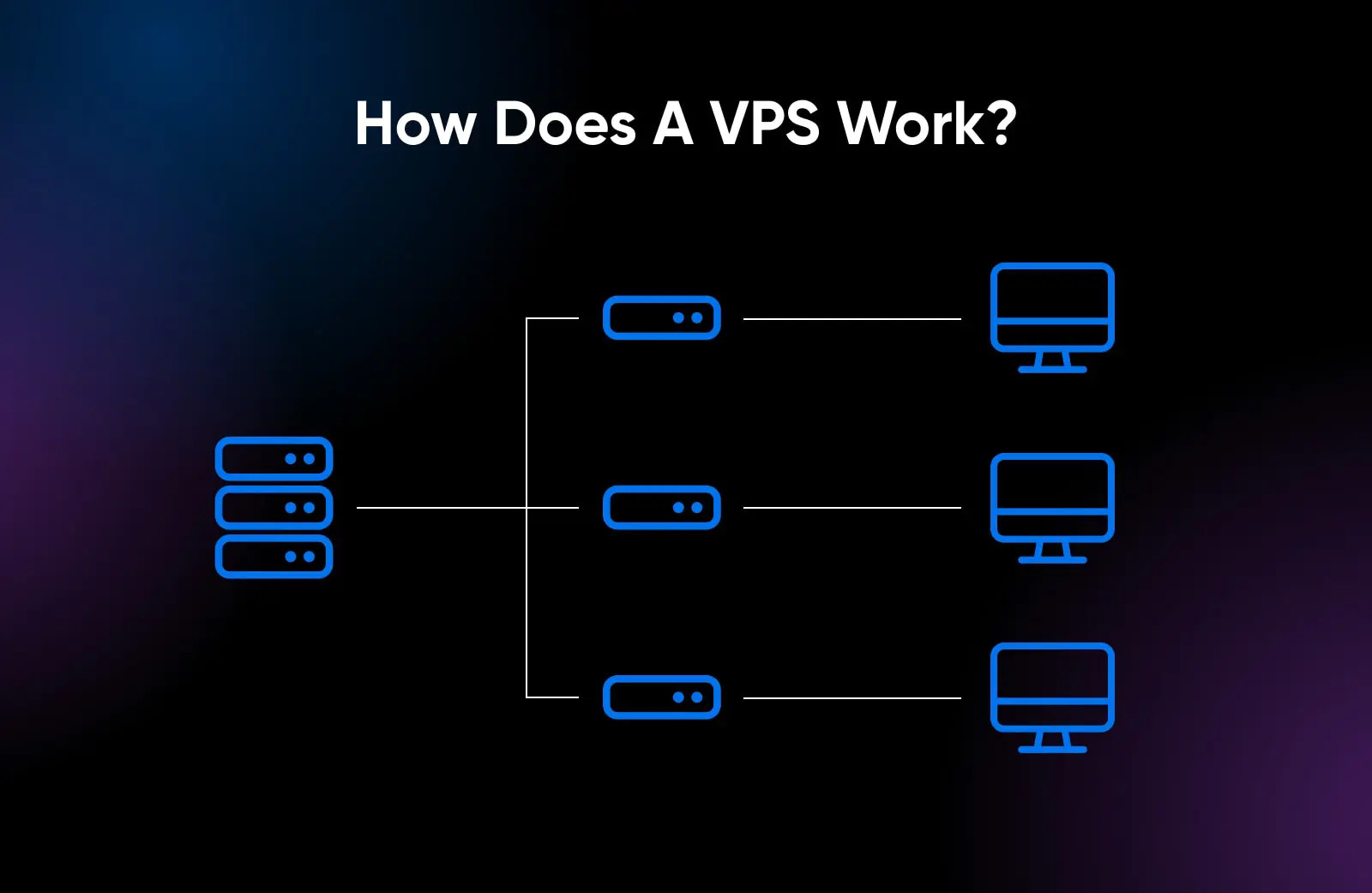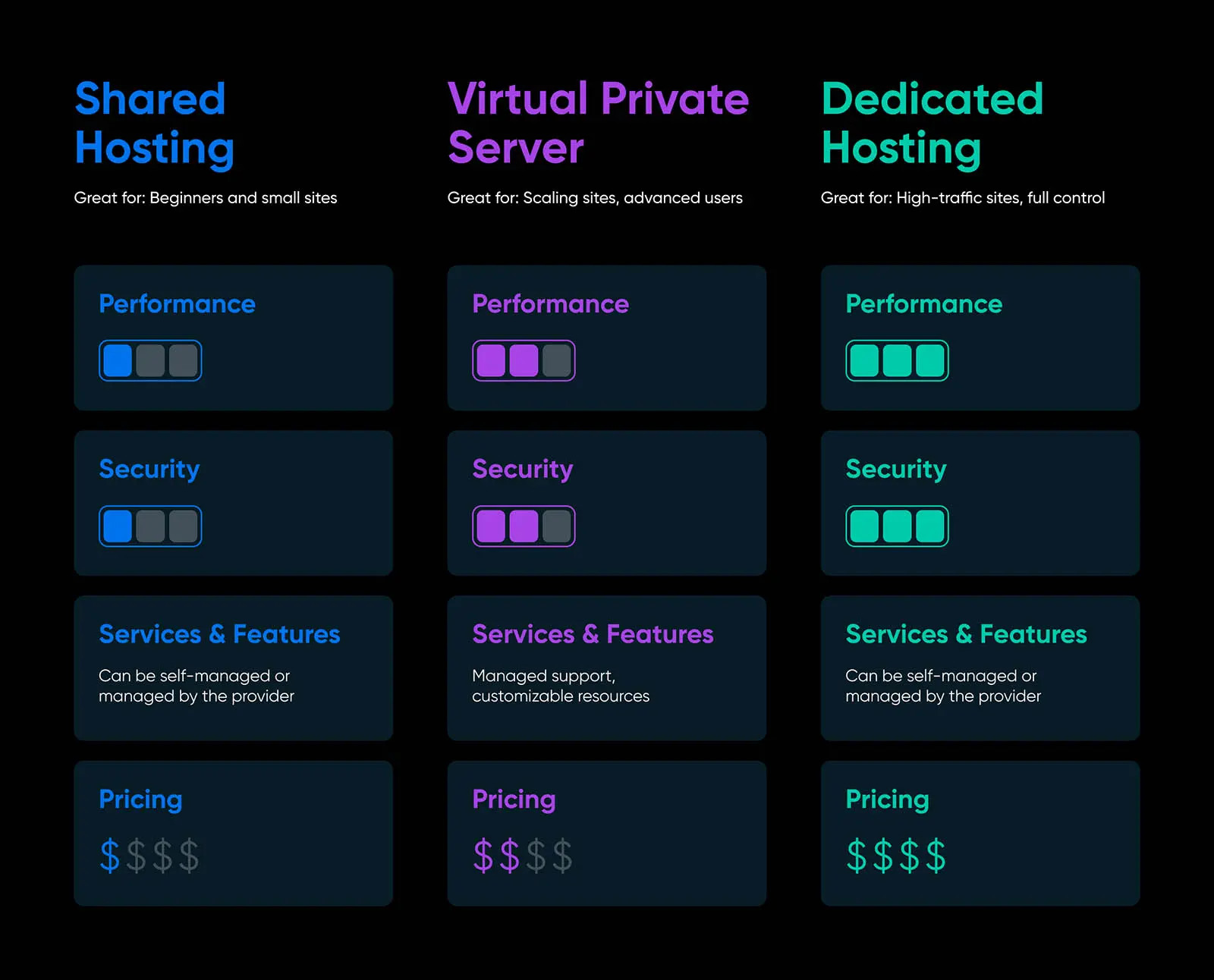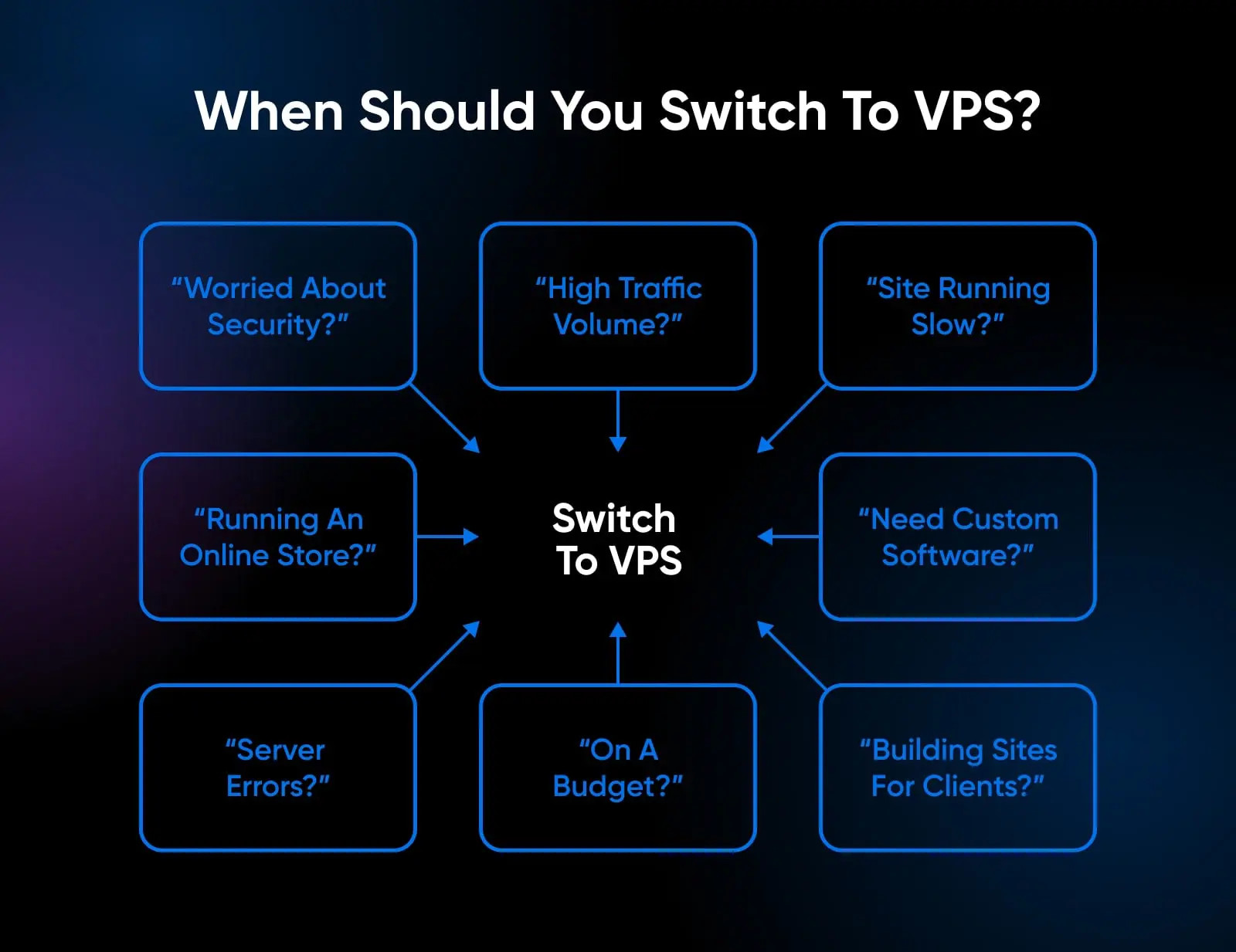Is your website experiencing growing pains? Is increased traffic leading to sluggish performance and frustrating user experiences? If so, it might be time to consider upgrading your hosting solution to a Virtual Private Server (VPS).
A VPS offers a powerful and versatile hosting environment, bridging the gap between basic shared hosting and expensive dedicated servers. But what exactly is a VPS server? In this guide, we’ll demystify VPS hosting, exploring its core components, benefits, and how it stacks up against other hosting types. We’ll also help you determine if a VPS is the right move for your growing online presence and guide you through choosing the best VPS plan.
 VPS Hosting
VPS Hosting
Decoding the Virtual Private Server
Let’s break down the term “Virtual Private Server” to understand its meaning:
- Server: At its heart, a server is simply a robust computer that stores all the files and data that make up your website. When someone types your domain name into their browser, this server is responsible for delivering your website content to their screen.
- Virtual: Virtualization is the key technology that powers VPS hosting. It involves dividing a single physical server into multiple isolated virtual machines. Think of it as partitioning a hard drive on your personal computer, but on a much larger and more sophisticated scale. Each virtual machine operates independently.
- Private: This is where the “private” aspect comes in. Within a VPS environment, your virtual server and its allocated resources are dedicated solely to you. This means you are not sharing critical resources like RAM, CPU, and storage with other users, ensuring consistent and reliable performance.
Essentially, a VPS provides you with the advantages of a dedicated server – resource isolation and control – but at a more accessible price point than traditional dedicated hosting. It’s a powerful solution for websites that require more than shared hosting can offer but may not yet need the full power (and cost) of a dedicated server.
How Does VPS Hosting Actually Work?
 How Does A VPS Work
How Does A VPS Work
VPS hosting leverages virtualization technology to create the illusion of having your own dedicated server, even though you are still sharing a physical server with other users. Here’s a closer look at the mechanics:
Your hosting provider installs a hypervisor, a specialized software layer, on the physical server’s operating system. This hypervisor acts as the virtualization engine, partitioning the server into isolated compartments, known as Virtual Machines (VMs) or virtual private servers.
Each VM functions as an independent server, complete with its own operating system, software installations, and dedicated resources. You have the freedom to choose your preferred operating system (often Linux distributions like Ubuntu, CentOS, or Debian are popular choices), install necessary software, and configure your server environment to perfectly match your website’s requirements. For instance, you can install Linux, manage databases with MySQL, and utilize a user-friendly control panel like cPanel to simplify server management tasks.
The crucial benefit of this setup is resource allocation. Unlike shared hosting where resources are pooled and shared among all users on the server, VPS hosting guarantees you a specific amount of resources. Your website’s performance remains consistent and is not impacted by the resource usage of other websites hosted on the same physical server.
In summary, VPS hosting provides a virtualized dedicated environment. Your website resides in a secure, isolated container with guaranteed resources like memory, storage space, and processing power – all for your exclusive use. You gain the control and performance of a dedicated server without the hefty price tag.
VPS Hosting: Weighing the Pros and Cons
A VPS server offers a compelling balance of dedicated resources and control at a cost-effective price. It sits in the sweet spot between the limitations of shared hosting and the expense of dedicated hosting, making it an ideal solution for many growing websites and applications.
Advantages of VPS Hosting:
- Cost-Effectiveness: VPS hosting is significantly more affordable than dedicated hosting while offering superior performance compared to shared hosting. It’s a budget-conscious upgrade for websites that have outgrown the constraints of shared servers.
- Customization and Control: VPS users enjoy extensive control over their server environment. You can customize server settings, install specific software, and optimize configurations to meet your unique website needs. This level of control is essential for websites with specialized technical requirements.
- Scalability: Scaling resources with VPS is incredibly flexible. As your website traffic grows, you can easily upgrade your VPS plan to increase CPU cores, RAM, and storage space to accommodate the increased demand. This scalability ensures your hosting solution can grow in tandem with your website.
- Dedicated Resources: VPS hosting guarantees dedicated resources like CPU, RAM, bandwidth, and disk space. These resources are not shared with other users, guaranteeing consistent performance and reliability, regardless of other websites’ activity on the physical server.
- Enhanced Security: VPS hosting provides improved security compared to shared hosting. By isolating each virtual server, VPS environments minimize the “bad neighbor effect” where security vulnerabilities on one shared hosting account can potentially impact others.
- Support and Maintenance Options: Many VPS hosting plans include varying levels of technical support and server management services, which can be invaluable for users who are not server administration experts.
Disadvantages of VPS Hosting:
- Technical Expertise May Be Required: Managing a VPS, especially an unmanaged VPS, can demand a certain level of technical proficiency. Users might need to be comfortable with server administration tasks, command-line interfaces, and software configuration.
- Potential for Resource Allocation Issues: While VPS aims to guarantee resources, improper configuration or overselling by the hosting provider can sometimes lead to performance issues. Choosing a reputable provider is crucial to mitigate this risk.
- Limited Hardware Control: With VPS hosting, you are still sharing a physical server, and therefore, you do not have direct control over the underlying hardware. If you require specific hardware configurations, dedicated hosting might be a better fit.
VPS Hosting Compared: Shared vs. Dedicated
 Shared Hosting vs VPS vs Dedicated Hosting
Shared Hosting vs VPS vs Dedicated Hosting
When choosing a web hosting solution, shared hosting, VPS hosting, and dedicated hosting represent the primary options. Understanding the distinctions between them is crucial for making the right decision for your website.
Shared Hosting: Entry-Level and Budget-Friendly
Shared hosting is the most common and affordable type of web hosting, making it a popular choice for new website owners and those with basic website needs. In a shared hosting environment, multiple websites reside on the same server and share server resources, including CPU, RAM, and storage space.
Imagine shared hosting as living in an apartment complex. You have your private apartment (your website), but you share common facilities like hallways, elevators, and utilities (server resources) with other residents (other websites).
The primary advantage of shared hosting is its low cost, as the server expenses are distributed among numerous users. However, because resources are shared, performance can be affected if another website on the server experiences a surge in traffic.
Shared hosting is suitable for:
- New websites and blogs with low traffic
- Small businesses and portfolio websites
- Websites with basic functionality and limited resource needs
Dedicated Hosting: Maximum Power and Control
Dedicated hosting provides the highest level of performance, control, and security. With dedicated hosting, you lease an entire physical server exclusively for your website. You have complete control over all server resources and can customize the hardware and software to your exact requirements.
Think of dedicated hosting as owning a house. You have complete control over the entire property (the server) and don’t share it with anyone.
Dedicated hosting offers unparalleled performance and customization but comes at a significantly higher cost compared to shared and VPS hosting.
Dedicated hosting is ideal for:
- High-traffic websites and large online businesses
- Websites with demanding performance requirements
- Applications requiring custom server configurations
- Businesses handling sensitive data and requiring maximum security
VPS Hosting: The Best of Both Worlds
VPS hosting strikes a balance between shared and dedicated hosting, offering a “middle ground” solution. Like shared hosting, multiple websites reside on the same physical server. However, with VPS hosting, each website operates within its own isolated virtual machine with dedicated resources.
Using the apartment analogy again, VPS hosting is like each apartment in the complex having its own dedicated set of utilities – a private lobby, elevator, and utility connections. Resource usage by one apartment (website) does not impact the others.
VPS hosting provides the benefits of dedicated resources and greater control at a more affordable price than dedicated hosting. It’s a versatile solution for websites that have outgrown shared hosting but don’t yet require the full expense of a dedicated server.
VPS hosting is well-suited for:
- Growing websites and e-commerce stores
- Websites with moderate to high traffic
- Applications requiring more control and resources than shared hosting
- Businesses seeking a balance of performance, control, and cost
Is it Time to Switch to VPS Hosting? Key Signs to Look For
 When Should You Switch To VPS
When Should You Switch To VPS
If your website is expanding, determining whether to upgrade to VPS hosting is a crucial decision. Here are eight key indicators that suggest you might be ready to make the switch:
-
Security Concerns Rise: While shared hosting offers basic security measures, VPS hosting provides enhanced security features such as dedicated firewalls, SSL certificate integration, and robust backup options. If you are handling sensitive data, processing payments, or require advanced security protocols, VPS is a necessary upgrade for the complete safety of your website and user data.
-
Experiencing High Traffic Volumes: Shared hosting can become strained when your website experiences significant traffic spikes. VPS hosting provides dedicated resources (CPU, RAM, bandwidth) that can efficiently handle increased visitor loads, ensuring smooth performance even during peak traffic periods.
-
Website Performance is Slowing Down: On shared servers, resources are shared, leading to potential performance bottlenecks as your website grows and content increases. If your website is consistently loading slowly, especially during peak hours, it’s a clear sign you are exceeding the resource limits of your shared hosting plan. VPS hosting provides the dedicated resources to maintain fast loading times and a positive user experience.
-
Launching an Online Store: If you plan to launch an e-commerce store, upgrading to VPS hosting is highly recommended. VPS environments offer the security and dedicated resources needed to meet PCI compliance standards, which are crucial for securely processing credit card transactions and protecting customer financial data.
-
Need for Custom Software and Configurations: Shared hosting environments typically have limitations on software installations and server configurations. If you need to install custom software, run specific applications, or require advanced server configurations, VPS hosting provides the necessary flexibility and control to tailor your server environment to your precise needs.
-
Frequent Server Errors: Recurring server errors, such as 503 errors or internal server errors, are often indicators of insufficient server resources. These errors disrupt user experience and can negatively impact your online business. Upgrading to VPS hosting with dedicated resources can significantly reduce server errors and ensure website stability.
-
Operating on a Budget: While dedicated hosting offers even more power and resources, it comes at a premium price. VPS hosting provides a cost-effective solution to address performance and resource limitations without the significant financial commitment of dedicated hosting. It’s a smart upgrade for businesses seeking improved performance within a reasonable budget.
-
Building Websites for Clients: For web developers and agencies building websites for clients, VPS hosting offers a powerful and reliable platform to host multiple websites without compromising performance. VPS ensures each client website has sufficient resources and operates smoothly, reflecting professionally on your services.
Choosing the Best VPS Hosting Plan: Key Considerations
Selecting the right VPS hosting plan is crucial for ensuring optimal performance and meeting your website’s specific needs. Here are key factors to consider when choosing a VPS hosting plan:
Managed vs. Self-Managed VPS
When choosing VPS hosting, you’ll typically encounter two options: managed VPS and self-managed (or unmanaged) VPS.
- Self-Managed VPS: With self-managed VPS, you have full control and responsibility for server administration, including operating system updates, security patching, software installations, and troubleshooting. This option requires strong technical skills and server management expertise.
- Managed VPS: Managed VPS hosting takes the burden of server administration off your shoulders. The hosting provider handles server maintenance, security updates, and technical support, allowing you to focus on your website content and business operations. Managed VPS is ideal for users who lack server administration expertise or prefer a hands-off approach to server management.
DreamHost’s VPS plans are fully managed, providing you with expert support and server maintenance so you can concentrate on building and growing your website.
Operating System: Linux vs. Windows
The majority of VPS hosting providers primarily offer Linux-based operating systems, such as Ubuntu, Debian, CentOS, and Red Hat Linux. Linux is favored due to its open-source nature, stability, security, and flexibility.
While Windows VPS options exist, they are less common and typically chosen only when Windows-specific software or applications are required. Linux VPS generally provides greater reliability and is the preferred choice for most hosting providers.
Reliability and Uptime Guarantees
Website uptime is critical for online businesses. Choose a VPS hosting provider that guarantees a high uptime percentage, ideally 99.5% or higher, as stated in their Service Level Agreement (SLA). For maximum reliability, consider providers offering 100% uptime guarantees, load balancing, redundancy, and failover mechanisms.
Hardware and Resources: Performance Matters
Opt for a VPS hosting provider that utilizes modern, high-performance hardware, including SSD storage for faster data access, ample RAM for smooth multitasking, generous bandwidth for handling traffic, and multi-core processors for processing power. Scalability is also essential to allow for easy upgrades as your website grows. Ensure the VPS plan’s specifications align with your website’s current and future resource requirements.
24/7 Customer Support: Assistance When You Need It
Even with managed VPS services, technical issues can arise unexpectedly. Choose a VPS provider that offers 24/7 customer support through multiple channels, such as phone, live chat, and ticketing systems. Prompt and responsive support is crucial for minimizing downtime and resolving issues quickly.
Backup Services: Data Protection
Data loss can be catastrophic. Select a VPS host that includes automated backup services, ideally daily or weekly backups, to protect your website data. Managed VPS providers often handle backups automatically in the background. Inquire about the backup frequency and data retention policies to ensure they meet your data recovery needs.
Ready to Embrace VPS Hosting?
Congratulations! You’ve now gained a comprehensive understanding of VPS hosting and its potential benefits for your growing website. Upgrading to VPS hosting is a strategic move to gain the resources, control, and reliability necessary to propel your website to the next level without exceeding your budget.
If you’re seeking a dependable VPS hosting provider, consider DreamHost’s Managed VPS Hosting. It offers a comprehensive suite of features, including 24/7 support, an intuitive control panel, scalable RAM, unlimited bandwidth, unlimited domain hosting, SSD storage, and a 100% uptime guarantee. Reach out to DreamHost’s support team to explore how their expert team can assist you with website management, marketing, and more.
DreamHost VPS: Setting Ourselves Apart
DreamHost understands you have numerous VPS hosting options. Here’s how DreamHost’s VPS offering stands out:
- 24/7 Expert Customer Support
- Intuitive, User-Friendly Control Panel
- Scalable RAM to Adjust to Your Needs
- Unlimited Bandwidth for Unrestricted Traffic
- Unlimited Hosting Domains on Most Plans
- Fast and Reliable SSD Storage
Consider DreamHost VPS for a powerful and supportive hosting experience as your website continues to grow.
Did you enjoy this article?
 Photo of Dan Kuciel Dan Kuciel
Photo of Dan Kuciel Dan Kuciel
Dan is a Product Marketing Manager based in Los Angeles. With a passion for building truly useful features, Dan helps improve the customer experience at DreamHost. In his spare time, Dan enjoys playing guitar, rock climbing with his girlfriend, and designing FPV drones. Connect with him on LinkedIn: https://www.linkedin.com/in/danielkuciel/

